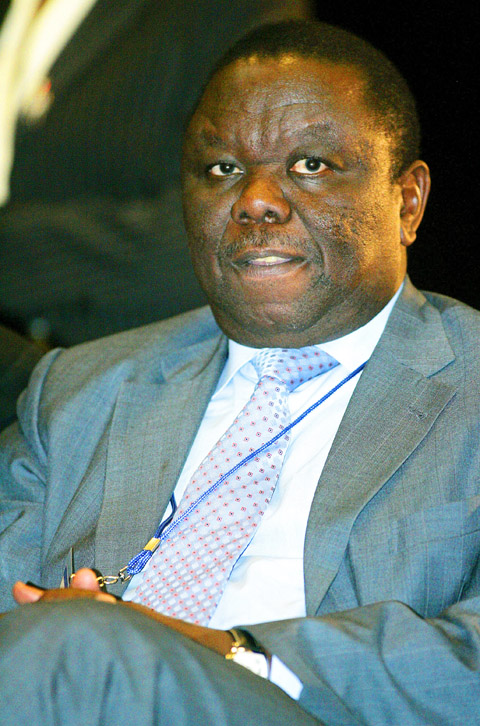Zimbabwe’s main political rivals were in South Africa yesterday for a regional summit with negotiators expected to aim for a resolution to the country’s political crisis.
Zimbabwean President Robert Mugabe’s attendance at the gathering of heads of state was controversial, with Botswana’s president snubbing the gathering after his government said it did not recognize the 84-year-old leader’s re-election.
Regional trade unions also planned protests and a group called the Zimbabwean Exile Forum said it was launching an urgent legal action at the Southern African Development Community tribunal in Windhoek to block Mugabe’s invitation.

PHOTO: AP
There was controversy even before the summit began, with main opposition leader Morgan Tsvangirai’s trip delayed on Thursday after authorities at Harare airport temporarily seized his passport.
He flew to South Africa on Friday, after his passport was returned.
The crisis that intensified following Mugabe’s re-election in a June run-off poll widely condemned as a sham was high on the summit’s agenda, and there were indications power-sharing talks between the rivals would resume.
The chief negotiator for Mugabe’s ZANU-PF party, Justice Minister Patrick Chinamasa, said: “Talks are going to resume on the sidelines of the SADC summit.”
Tsvangirai said he was “hopeful” talks would resume, but a spokesman provided few details.
“Any dialogue that happens will happen within the context of the summit,” said Nqobizitha Mlilo, spokesman for the main opposition.
Power-sharing talks were stalled when three days of negotiations adjourned on Tuesday after Tsvangirai said he needed more time to consider a deal agreed to by Mugabe and Arthur Mutambara, who heads a smaller opposition faction.
Tsvangirai believes he has the right to the lion’s share of power since he finished ahead of Mugabe in the March first round of the presidential election.
ZANU-PF has insisted Mugabe must be recognized as president in any deal, as he won the June vote in which he was the only candidate after Tsvangirai boycotted it.
South African Foreign Minister Nkosazana Dlamini-Zuma said on Friday talks between the rivals would push ahead “until we find a solution.”
“Of course there isn’t power-sharing right now, but the talks are still going on,” she told reporters. “Until we find a solution they will continue to go on because SADC doesn’t have the luxury of walking away from Zimbabwe.”
Tsvangirai boycotted the June presidential run-off after saying violence against his supporters had left dozens dead and thousands injured.
Mugabe defied international and regional calls to postpone the vote and pushed ahead with it anyway, handing himself a new term.

VAGUE: The criteria of the amnesty remain unclear, but it would cover political violence from 1999 to today, and those convicted of murder or drug trafficking would not qualify Venezuelan Acting President Delcy Rodriguez on Friday announced an amnesty bill that could lead to the release of hundreds of prisoners, including opposition leaders, journalists and human rights activists detained for political reasons. The measure had long been sought by the US-backed opposition. It is the latest concession Rodriguez has made since taking the reins of the country on Jan. 3 after the brazen seizure of then-Venezuelan president Nicolas Maduro. Rodriguez told a gathering of justices, magistrates, ministers, military brass and other government leaders that the ruling party-controlled Venezuelan National Assembly would take up the bill with urgency. Rodriguez also announced the shutdown

Civil society leaders and members of a left-wing coalition yesterday filed impeachment complaints against Philippine Vice President Sara Duterte, restarting a process sidelined by the Supreme Court last year. Both cases accuse Duterte of misusing public funds during her term as education secretary, while one revives allegations that she threatened to assassinate former ally Philippine President Ferdinand Marcos Jr. The filings come on the same day that a committee in the House of Representatives was to begin hearings into impeachment complaints against Marcos, accused of corruption tied to a spiraling scandal over bogus flood control projects. Under the constitution, an impeachment by the

Exiled Tibetans began a unique global election yesterday for a government representing a homeland many have never seen, as part of a democratic exercise voters say carries great weight. From red-robed Buddhist monks in the snowy Himalayas, to political exiles in megacities across South Asia, to refugees in Australia, Europe and North America, voting takes place in 27 countries — but not China. “Elections ... show that the struggle for Tibet’s freedom and independence continues from generation to generation,” said candidate Gyaltsen Chokye, 33, who is based in the Indian hill-town of Dharamsala, headquarters of the government-in-exile, the Central Tibetan Administration (CTA). It

A Virginia man having an affair with the family’s Brazilian au pair on Monday was found guilty of murdering his wife and another man that prosecutors say was lured to the house as a fall guy. Brendan Banfield, a former Internal Revenue Service law enforcement officer, told police he came across Joseph Ryan attacking his wife, Christine Banfield, with a knife on the morning of Feb. 24, 2023. He shot Ryan and then Juliana Magalhaes, the au pair, shot him, too, but officials argued in court that the story was too good to be true, telling jurors that Brendan Banfield set